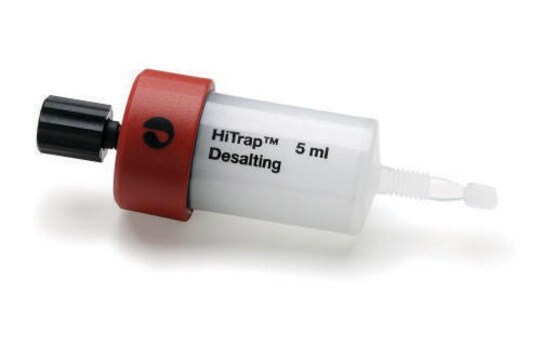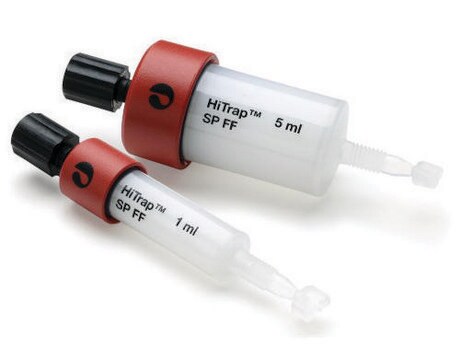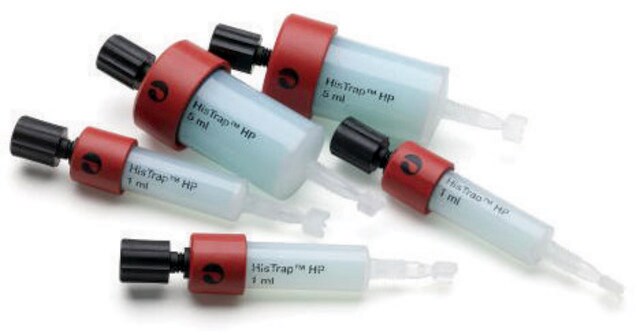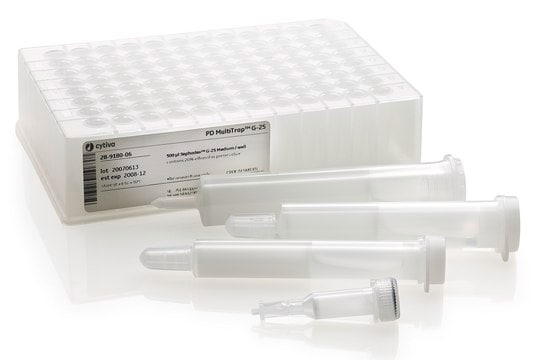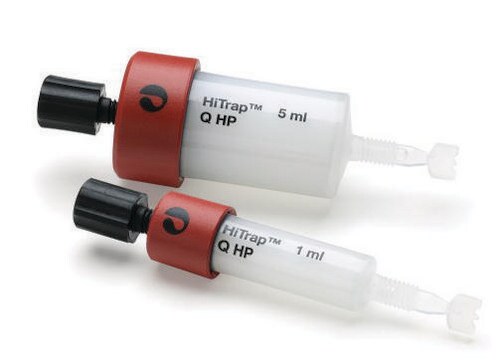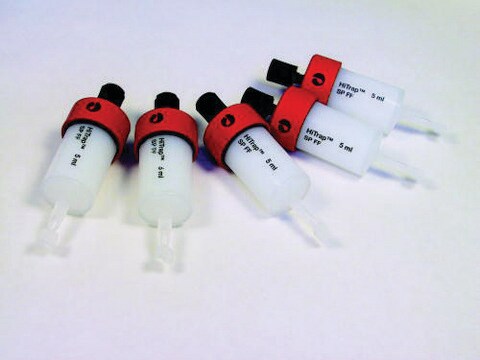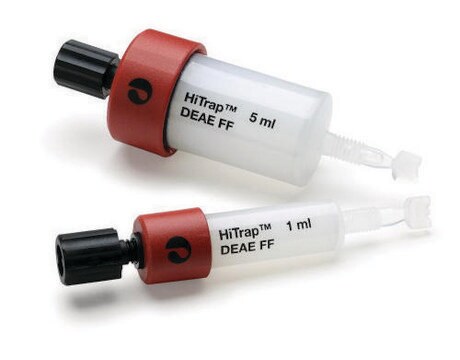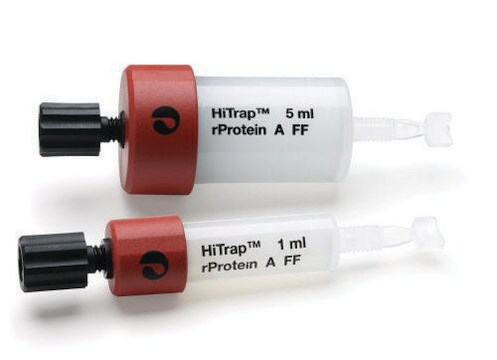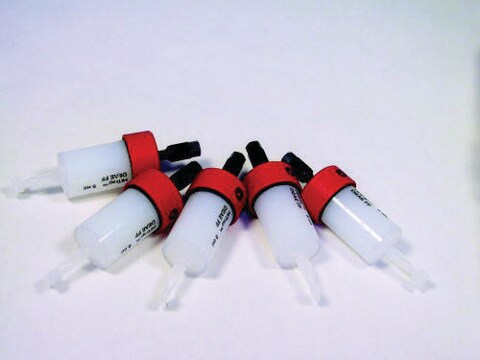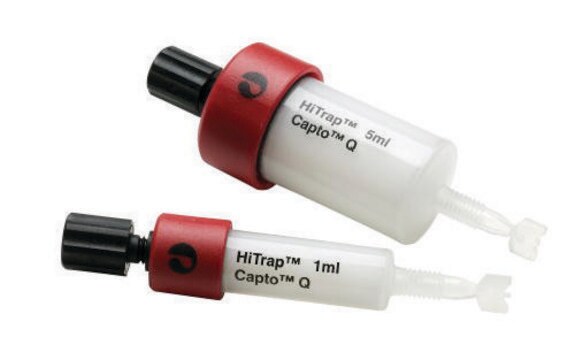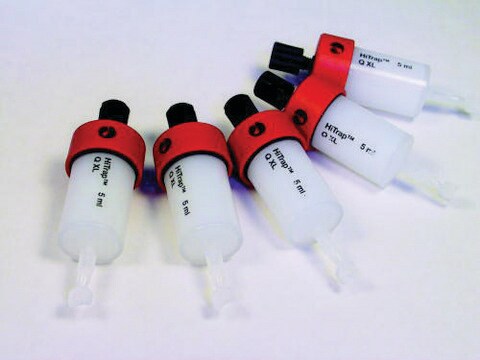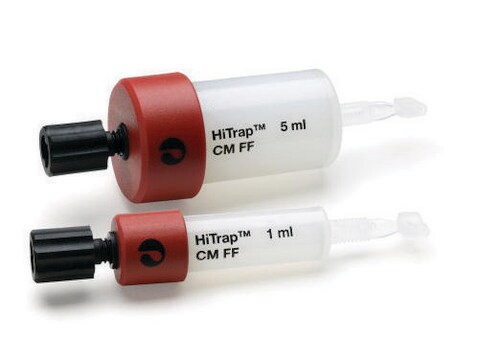GE17-6002-33
HiTrap® IEX Selection Kit
Cytiva 17-6002-33
Synonym(s):
IEX Selection Kit
About This Item
Recommended Products
ligand
quaternary amine
description
Ion Exchanger Type (value)
packaging
pkg of 7 ea
manufacturer/tradename
Cytiva 17-6002-33
parameter
42 psi
bed size
7 mm × 25 mm
bed volume
1 mL
column I.D.
7 mm
matrix
6% cross-linked agarose
particle size
45-165 μm
average diameter
90 μm
cleaning
2-14
working range
2-12
suitability
suitable for bioprocess medium
Related Categories
General description
Q, SP, DEAE, and CM Sepharose™ Fast Flow are based on a robust, 6% highly cross-linked beaded agarose matrix with good flow properties and high loading capacities. ANX Sepharose™ 4 Fast Flow (high sub) is based on 4% highly cross-linked beaded agarose. This results in a medium with higher porosity, which is particularly useful for the purification of high molecular mass proteins.Q and SP Sepharose™ XL media have long chains of dextran coupled to a robust, 6% highly cross-linked agarose matrix. The dextran chains increase the exposure of the Q or SP charged groups, which results in very high loading capacities. The active end of the charged group is the same for DEAE Sepharose Fast Flow and ANX Sepharose™ Fast Flow (high sub), the difference is the length of the carbon chain of the charged group. DEAE Sepharose Fast Flow has a diethylaminoethyl-group bound to the agarose whilst ANX Sepharose™ 4 Fast Flow (high sub) has a diethylaminopropyl group attached. After choosing the optimal medium, prepacked columns and bulk media are available for larger scale preparative work.
Features and Benefits
- Fast and easy selection with seven different ion-exchange ligands on Sepharose™ Fast Flow and Sepharose™ XL, prepacked in 1 mL HiTrap® columns.
- Offers a fast, easy and convenient way screen for the optimal media for a given application .
- Excellent for optimization studies; buffer composition, pH, flow rate, sample loading, and elution scheme can be optimized with small sample quantities prior to scale-up.
- Designed for use with a syringe, peristaltic pump, or chromatography system such as AKTA design.
Storage and Stability
Analysis Note
Legal Information
Related product
signalword
Warning
hcodes
Storage Class
3 - Flammable liquids
Choose from one of the most recent versions:
Certificates of Analysis (COA)
It looks like we've run into a problem, but you can still download Certificates of Analysis from our Documents section.
If you need assistance, please contact Customer Support.
Already Own This Product?
Find documentation for the products that you have recently purchased in the Document Library.
Customers Also Viewed
Articles
This page provides information about the principles and standard conditions for different purification techniques for the purification of multiprotein complexes with from Cytiva.
This page describes principles and standard conditions for different purification techniques of histidine-tagged proteins using Cytiva products.
This page covers the standard ÄKTAdesign configurations for simple IEX chromatography.
This page shows volatile and non-volatile buffer suggestions for anion and cation exchange chromatography.
Protocols
This page covers the principles and methods of chromatofocusing, a chromatography technique that separates proteins according to differences in their isoelectric point (pI).
Global Trade Item Number
| SKU | GTIN |
|---|---|
| GE17-6002-33 | 4061837622786 |
Our team of scientists has experience in all areas of research including Life Science, Material Science, Chemical Synthesis, Chromatography, Analytical and many others.
Contact Technical Service
